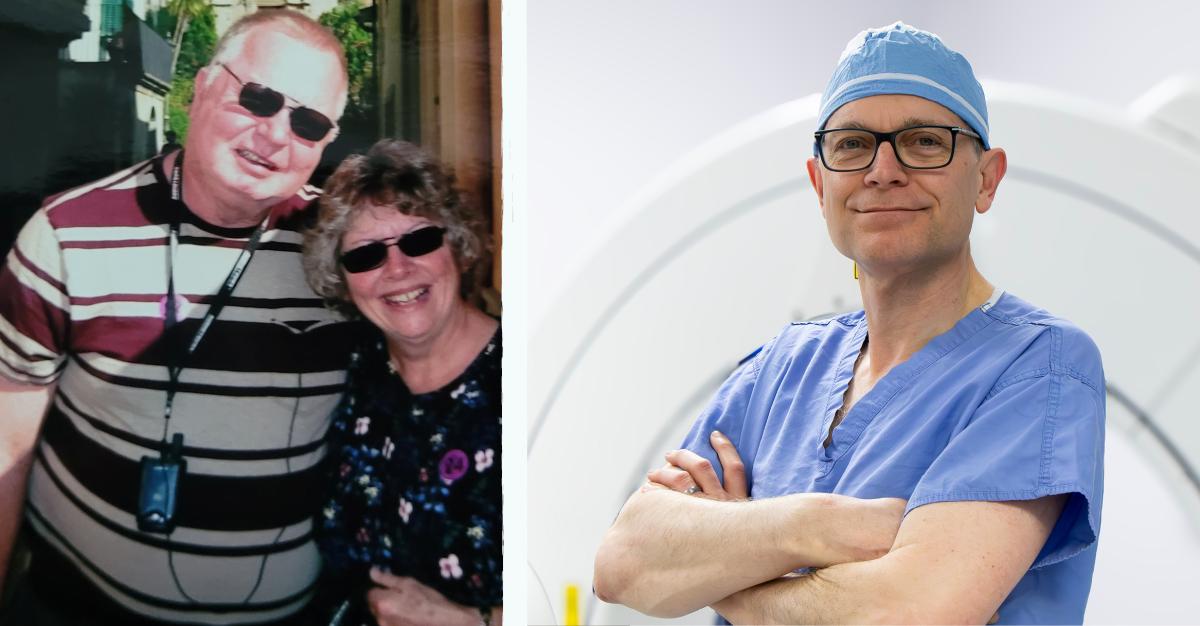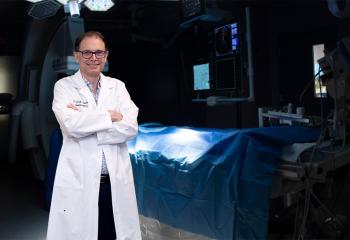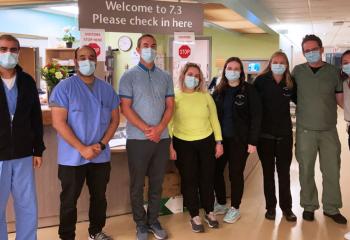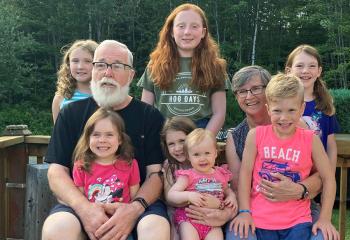
Larry and Pam Giffin (left) and QEII neurosurgeon, Dr. David Clarke (right). Larry received two life-changing neurosurgeries from Dr. Clarke, with Pam supporting Larry's recovery every step of the way.
Facing a shocking diagnosis can feel like steering a ship through a storm. It’s a great comfort when you have a dedicated crew, like healthcare providers and loved ones, to help you navigate.
For Pam and Larry Giffin, each day of smooth sailing spent together is a win made possible by their resilience and learned experience, combined with the extraordinary care provided for nearly 25 years by the neuropituitary team at the QEII Health Sciences Centre.
Lately, Pam and Larry’s days in Dartmouth, Nova Scotia, are usually spent appreciating simple pleasures. Now both retired, they enjoy a daily 10 a.m. morning walk, gardening during the warm months, the occasional shopping trip, and some travelling. Each evening, they share a late-night candlelit dinner.
These treasured routines have been hard-won, as the couple has faced one life-changing diagnosis, two brain surgeries and decades of adaptation and recovery.
They’ve also connected with a QEII healthcare team that’s supported them every step of the way with care that Pam describes as “phenomenal.”
When Larry began having frequent, severe headaches in 1999, he was initially diagnosed with a sinus infection. As the pain persisted, he pressed for more answers.
A CT scan just days before Christmas revealed the unexpected – a brain tumour.
That moment marked the beginning of Pam and Larry’s long journey with the QEII's Halifax Neuropituitary Clinic, where they met neurosurgeon Dr. David Clarke.
“He explained to us that it was a brain tumour and that he's probably had it for years, and that it had to come out,” says Pam.
“It was shocking. It’s not something you expect to hear.”
Dr. Clarke performed Larry’s first brain surgery on January 20, 2000. He’d warned them that some brain tumours “pop out like a pea,” while others wrap around vital structures “like an octopus.”
Larry’s tumour was the latter, wrapped around the optic nerve. Unfortunately, the complex tumour could not be entirely removed.
Despite the tumour’s complexity, Larry recovered quickly. At 53, and in good health otherwise, he was home within days. While the tumour was benign, however, its location on the optic nerve meant that he would have to be followed closely.
Pam fondly refers to the group of QEII professionals that they saw regularly as “the gang,” including Dr. Clarke, endocrinologist Dr. Imran, and ophthalmologist Dr. Mishra.
“They make you feel like nothing’s off the table. You can ask anything,” Pam says.
Almost a decade later, in 2009, Larry’s vision began to decline. His tumour had grown. And a second surgery was needed.
Dr. Clarke operated once more, this time taking a much more aggressive approach, a decision that meant removing the entire tumour, but severing Larry’s pituitary stem connection in the process.
“Dr. Clarke was very worried about his eyesight,” says Pam. “We didn’t know if he was going to be blind or not.”
The surgery was successful, and Larry kept his vision. But his recovery was more difficult this time around.
“He developed post-operative delirium,” Pam explains, a condition that can cause confusion and disorientation and is more common in patients after surgeries that may affect vision.
Two weeks later, a simple, familiar phrase during a walk outside of the hospital gave Pam some hope that Larry was getting back to his old self.
“He said, ‘Oh, Pam, isn’t the fresh air lovely?’ I called the hospital right away and said I was ready to take him home.”
Since then, life has required many adjustments. Larry’s severed pituitary stem interferes with his brain’s communication with the pituitary gland, essential to producing several important hormones. Larry now takes hormone supplements to replace what his body can no longer produce.
The endocrinology team, including Dr. Imran and registered nurse Lisa Tramble, worked to help balance Larry’s hormonal treatments.
“It took a while to find the right balance, especially for the cortisol,” says Pam, explaining that the dose of this hormone, key to the body’s stress response, needs to be adjusted when Larry experiences stress or illness.
From administering biweekly testosterone injections at home to adapting medication routines on-the-go, Pam herself has become an integral part of Larry’s care team.
“It’s been a road, but we’re getting through it. He’s doing very well now.”
Their QEII team continues to provide ongoing guidance, with regular check-ins to ensure Larry is coping well.
Because Larry’s post-surgical condition is rare, Pam shares that collaborating with QEII professionals has, at times, felt like a partnership. When meeting with Dr. Imran, he’s always eager not only to share his knowledge, but to learn from Larry and Pam’s lived experiences.
“I don’t know how many people have had their pituitary stem severed," Pam explains. "So Dr. Imran is always asking ‘How did you deal with this?’ or ‘How did it feel?"
Dr. Imran explains that this open way of sharing and learning together has led to insights that improved the care of future patients: “Walking with Pam and Larry on their path to recovery taught us many lessons that have subsequently helped many other patients."
It’s no question that Pam and Larry’s journey has been a long one, stacked with several pivots and adjustments. Dr. Clarke admires the couple’s perseverance.
"Larry did have a very unusual tumour and he had a very difficult time after the second surgery,” he says.
“It was his determination, bolstered by Pam's ever-present support and the support of our wonderful care team, that Larry was able to make such an impressive recovery.”
Through his experience working with Larry, Dr. Clarke says he has also gained some meaningful perspective on the healing process:
“Larry's journey through the second surgery taught me how important it is to be patient and persistent on the road to recovery.”

Pam and Larry’s deep gratitude for the care they've received inspired them to become supporters of the QEII Foundation, donating monthly as QEII Change Makers.
They’ve chosen to support Highest Priority Needs, ensuring that QEII care teams can swiftly access resources to address pressing needs.
Now, more than 25 years after Larry’s first surgery, the couple still praises the life-changing care that Larry received at the QEII – and that he’s continued to receive throughout the years.
“We’ve dealt with the QEII a lot,” she says. “It's been years and years of help that we've received and wonderful, excellent care,” says Pam. “I just can't say enough good about them.”
She also shares that many other family members have relied on the QEII, with Larry’s father and both of Pam’s parents receiving essential care for cancer and brain aneurysms.
Pam and Larry are also proud to support local health care here in Nova Scotia, the place they’ve always called home. “We’ve travelled a lot, but there’s just no place like it,” Pam smiles.
“We feel our money is going to something useful and necessary,” Pam adds, noting the exceptionally advanced level of care available at the QEII. “A lot of people don’t realize that Halifax is a very progressive place for medicine.”
The QEII's neuropituitary team is deeply moved by Pam and Larry’s decision to give back to the hospital that supported them:
“Larry and Pam are wonderful people, and I am so glad that they are doing so well together. The fact that they are so grateful in very tangible ways is very touching and inspiring,” says Dr. Clarke, a sentiment shared by Dr. Imran and other team members.
And through their support of the QEII Foundation, this resilient couple is helping write the next chapter for health care in Nova Scotia, ensuring that other families can count on the same incredible, collaborative care they received when it mattered most.
The QEII's Halifax Neuropituitary Clinic was established 25 years ago and is jointly run by Dr. Ali Imran (Endocrinology), Dr. David Clarke (Neurosurgery) and a dedicated team of nurses (RN Lisa Tramble and RN Andrea Hebb). The team is supported by the pituitary clinic coordinator, Suzanne Woodman.


